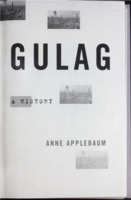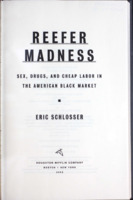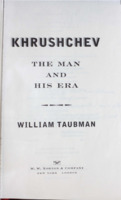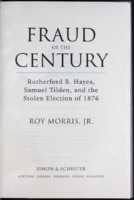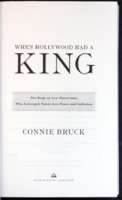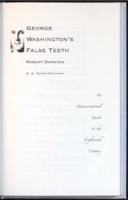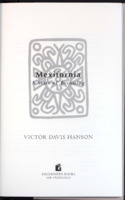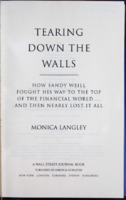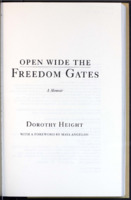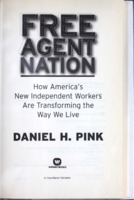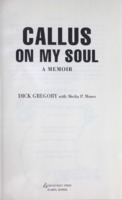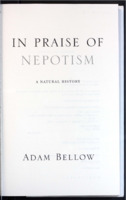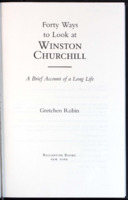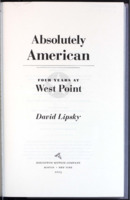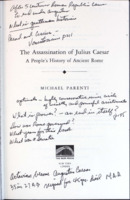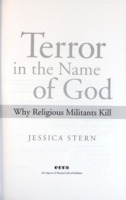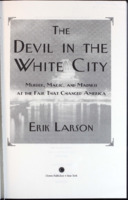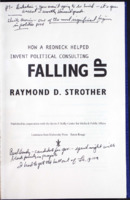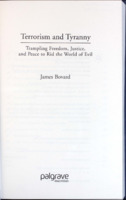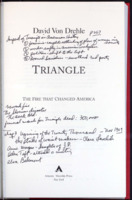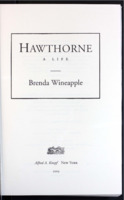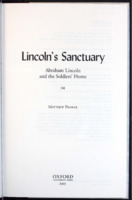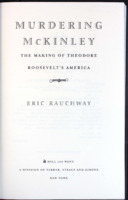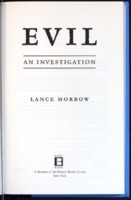Search
540 items
-
Gulag : a history
A fully documented history of the Soviet camp system, from its origins in the Russian Revolution to its collapse in the era of glasnost. Anne Applebaum first lays out the chronological history of the camps and the logic behind their creation, enlargement, and maintenance. Applebaum also examines how life was lived within this shadow country: how prisoners worked, how they ate, where they lived, how they died, how they survived. She examines their guards and their jailers, the horrors of transportation in empty cattle cars, the strange nature of Soviet arrests and trials, the impact of World War II, the relations between different national and religious groups, and the escapes, as well as the extraordinary rebellions that took place in the 1950s. She concludes by examining the disturbing question why the Gulag has remained relatively obscure, in the historical memory of both the former Soviet Union and the West. -
Reefer madness : sex, drugs, and cheap labor in the American black market
Reports on America's "shadow" economy of illegal drugs, pornography, and illegal migrant workers, arguing that these underground industries continue to grow with government intervention. -
Khrushchev : the man and his era
Drawing on newly opened archives in Russia and Ukraine, Taubman (political science, Amherst College) writes a thorough biography of one of the most complex and important political figures of the 20th century whose life and career spanned revolution, civil war, famine, collectivization, industrialization, terror, world war, the Cold War, Stalinism, and post-Stalinism. Includes two sections of good quality b&w photographs. -
Fraud of the century : Rutherford B. Hayes, Samuel Tilden, and the stolen election of 1876
In this work of popular history and scholarship, acclaimed historian and biographer Roy Morris, Jr., tells the extraordinary story of how, in America's centennial year, the presidency was stolen, the Civil War was almost reignited, and black Americans were consigned to nearly ninety years of legalized segregation in the South. "The bitter 1876 contest between Ohio Republican governor Rutherford B. Hayes and New York Democratic governor Samuel J. Tilden is the most sensational, ethically sordid, and legally questionable presidential election in American history. The first since Lincoln's in 1860 in which the Democrats had a real chance of recapturing the White House, the election was in some ways the last battle of the Civil War, as the two parties fought to preserve or overturn what had been decided by armies just eleven years earlier." "Riding a wave of popular revulsion at the numerous scandals of the Grant administration and a sluggish economy, Tilden received some 260,000 more votes than his opponent. But contested returns in Florida, Louisiana, and South Carolina ultimately led to Hayes's being declared the winner by a specially created, Republican-dominated Electoral Commission after four tense months of political intrigue and threats of violence. President Grant took the threats seriously: he ordered armed federal troops into the streets of Washington to keep the peace."--BOOK JACKET. -
When Hollywood had a king : the reign of Lew Wasserman, who leveraged talent into power and influence
A history of the Music Corporation of America traces the entertainment giant from its founding in 1924, through its rise to become the most powerful force in the film world under the visionary leadership of Lew Wasserman. -
George Washington's False Teeth : An Unconventional Guide to the Eighteenth Century
A collection of articles concentrated on the Enlightenment in France argues for a scaled-down interpretation of the significance of the movement. -
Mexifornia : a state of becoming
Discusses the historical, political, and personal aspects regarding immigration policies for Mexico and how these policies are effecting Mexican immigrants, illegal aliens, and Californians. -
Tearing down the walls : how Sandy Weill fought his way to the top of the financial world-- and then nearly lost it all
The very night that Sanford Sandy" Weill, the chairman and chief executive officer of Citigroup, was being feted on the floor of the New York Stock Exchange as CEO of the Year, the television screens above the floor were flashing danger: A congressional panel was tearing into Jack Grubman, the $20-million-a-year telecommunications analyst who worked for Sandy. Had Grubman and Citigroup favored corporate clients at the expense of average investors? Was Citigroup recommending stocks of troubled companies to get their business? The worst scandal of Sandy Weill's long career was breaking around him."."Tearing Down the Walls provides an unprecedented look at how business and finance are conducted at the highest levels, with extraordinary insight into the character and motivations of powerful men and women. And it's the account of the interplay between power and personality - Sandy Weill, the son of an immigrant dressmaker, is a larger-than-life character, a legendary Wall Street CEO whose innovativeness, opportunism, and even fear drove him from the lowliest job on Wall Street to its most commanding heights.Over a span of five decades he has tangled with - and usually bested - some of the most prominent and powerful titans of finance, including the elitist financier John Loeb, the mutual-fund gunslinger and conglomerateur Gerald Tsai, the patrician American Express chairman Jim Robinson, and the cerebral banking visionary John Reed. A consummate deal maker, Sandy Weill amassed and then lost an astounding assemblage of securities firms, only to plunge ahead to rebuild his empire and ultimately create the modern American financial-services supermarket. At the center of Citigroup's recent crises, he's the mogul many are waiting to see topple, while many more are trying to figure out how he succeeded."."Using nearly five hundred firsthand interviews with key players in his life and career - including Weill himself - The Wall Street Journal's Monica Langley chronicles not only his public persona, but his hidden side: blunt and often crude, yet unpretentious and sometimes disarmingly charming. Tearing Down the Walls reveals Weill's tyrannical rages as well as his tearful regrets, the crass stinginess and the unprecedented generosity, the fierce sense of loyalty and the ruthless elimination of potential rivals - even those he loves.Langley illuminates a climb to the top filled with class conflict - Jew against WASP, immigrant against Mayflower descendant, entrepreneur against establishment - and explores the volatile personality that inspires slavish devotion or utter disdain. By highlighting in new and startling detail one man's life in a narrative as richly textured and compelling as a novel, Tearing Down the Walls provides the historical context of the dramatic changes not only in business but also in American society in the last half century. It is essential for understanding the forces that are reshaping the American financial system today."--BOOK JACKET. -
Achievement matters : getting your child the best education possible
Presents tips and stategies for African American parents that reveal how to attain higher educational standards in the schools. -
Open wide the freedom gates : a memoir
[The author] marched at major civil rights rallies, sat through tense White House meetings, and witnessed every significant victory in the struggle for racial equality. Yet as the sole woman among powerful, charismatic men, and as someone whose personal ambition was always secondary to her passion for her cause, she has received little mainstream recognition ... In [this] memoir, [she] reflects on a life of service and leadership.--Jacket. -
Free agent nation : how America's new independent workers are transforming the way we live
Daniel Pink's work about self-employed Americans. -
Callus on my soul : a memoir
Memoir by humorist Dick Gregory. -
In praise of nepotism : a natural history
Presents an exploration of nepotism, the favored treatment of one's relatives, arguing that the practice has its roots in human biological behavior and that it represents the bonds of human society and the transmission of family legacies. -
Forty ways to look at Winston Churchill : a brief account of a long life
An accessible portrait of Winston Churchill captures the contradictions and complexities of the legendary British leader as it presents forty contrasting views of the man, his life, his accomplishments, and his contributions to history. -
Absolutely American : four years at West Point
Drawing on complete, unprecedented access to West Point and its cadets, David Lipsky explores the academy's rich history, describes the demanding regimen that swallows students' days, and examines the Point as a reflection of our society. Is it a quaint anachronism, or does it still embody the ideals of equality, honesty, and loyalty that moved Theodore Roosevelt to proclaim it the most "absolutely American" institution? Lipsky tackles these questions through superbly crafted portraits of cadets and the elite officers who mold them, following them into classrooms, barracks, mess halls, and military exercises. His reportage extends from 1998 through 2002, arguably the most eventful four years in West Point history. He witnesses the end of hazing, the arrival of TV and telephones in dorm rooms, the exposure and concealment of several scandals, and the dramatic aftermath of 9/11. He depicts young people of every race and class, and details a rigorous training program that erases their preconceptions and makes them a tight-knit community. -
The assassination of Julius Caesar : a people's history of ancient Rome
Most historians, both ancient and modern, have viewed the Late Republic of Rome through the eyes of its rich nobility. They regard Roman commoners as a parasitic mob, a rabble interested only in bread and circuses. They cast Caesar, who took up the popular cause, as a despot and demagogue, and treat his murder as the outcome of a personal feud or constitutional struggle, devoid of social content. In The Assassination of Julius Caesar, the author Michael Parenti subjects these assertions of gentlemen historians" to a bracing critique, and presents us with a compelling story of popular resistance against entrenched power and wealth. Parenti shows that Caesar was only the last in a line of reformers, dating back across the better part of a century, who were murdered by opulent conservatives. Caesar's assassination set in motion a protracted civil war, the demise of a five-hundred-year republic, and the emergence of an absolutist rule that would prevail over Western Europe for centuries to come." "Parenti reconstructs the social and political context of Caesar's murder, offering fascinating details about Roman society. In these pages we encounter money-driven elections, the struggle for economic democracy, the use of religious augury as an instrument of social control, the sexual abuse of slaves, and the political use of homophobic attacks. Here is a story of empire and corruption, patriarchs and subordinated women, self-enriching capitalists and plundered provinces, slumlords and urban rioters, death squads and political witch-hunts."--Jacket. -
Terror in the name of God : why religious militants kill
For four years, the author interviewed extremist members of three religions around the world: Christians, Jews, and Muslims. Traveling extensively to refugee camps in Lebanon, to religious schools in Pakistan, to prisons in Amman, Asqelon, and Pensacola, she discovered that the Islamic jihadi in the mountains of Pakistan and the Christian fundamentalist bomber in Oklahoma have much in common. Based on her vast research, she lucidly explains how terrorist organizations are formed by opportunistic leaders who, using religion as both motivation and justification, recruit the disenfranchised. She depicts how moral fervor is transformed into sophisticated organizations that strive for money, power, and attention. Her extensive interaction with the faces behind the terror provide unprecedented insight into acts of inexplicable horror, and enable her to suggest how terrorism can most effectively be countered. -
The devil in the white city : murder, magic, and madness at the fair that changed America
Two men, each handsome and unusually adept at his chosen work, embodied an element of the great dynamic that characterized America's rush toward the twentieth century. The architect was Daniel Hudson Burnham, the fair's brilliant director of works and the builder of many of the country's most important structures, including the Flatiron Building in New York and Union Station in Washington, D.C. The murderer was Henry H. Holmes, a young doctor who, in a malign parody of the White City, built his "World's Fair Hotel" just west of the fairgrounds₇a torture palace complete with dissection table, gas chamber, and 3,000-degree crematorium. Burnham overcame tremendous obstacles and tragedies as he organized the talents of Frederick Law Olmsted, Charles McKim, Louis Sullivan, and others to transform swampy Jackson Park into the White City, while Holmes used the attraction of the great fair and his own satanic charms to lure scores of young women to their deaths. What makes the story all the more chilling is that Holmes really lived, walking the grounds of that dream city by the lake. The Devil in the White City draws the reader into a time of magic and majesty, made all the more appealing by a supporting cast of real-life characters, including Buffalo Bill, Theodore Dreiser, Susan B. Anthony, Thomas Edison, Archduke Francis Ferdinand, and others. In this book the smoke, romance, and mystery of the Gilded Age come alive as never before. Erik Larson's gifts as a storyteller are magnificently displayed in this rich narrative of the master builder, the killer, and the great fair that obsessed them both. -
Falling up : how a redneck helped invent political consulting
Growing Up in Texas "Get the Hell Out of Here. You Have a Future" The Louisiana Years A Short Sheriff and a Long Pistol The First Lessons Light Bulbs and Bookmarks Sunshine Rains on Me James Carville and Iceberg Lettuce The Awakening Season of Discontent The Kingfish Lends a Hand What Is It You Do, Sir? I Know Lloyd Bentsen, and He Is a Friend of Mine A Pretty Woman with a Smudge on Her Cheek The Clock Ticks The Wise Ones Stumble Again Bill, Hillary, Al, and the Gang Buddy Roemer and the Silver Bullet Where Dreams Go When They Die Marriage on the Rocks, Up with a Twist Kicking Ass and Taking Names Buying Friends and Influencing People Blue Chips, Dwarfs, and Survival The Sea Creatures Crawl to the Shore The Chill Winds of September. The political consultant describes his life and career, first in Louisiana politics and then advising such presidential candidates as Gary Hart and Bill Clinton. -
Terrorism and tyranny : trampling freedom, justice, and peace to rid the world of evil
"In Terrorism and Tyranny, Bovard casts yet another jaundiced eye on Washington and the motives behind protecting "the homeland" and starting a controversial, unprovoked war with Iraq. Do you think that you’re safer now that the Federal Government has a Homeland Security czar? Think that your civil liberties and privacy are still intact? Think again on both counts. For Bovard, the Bush administration’s war on terror all comes down to a trampling of personal liberty that is more effective in winning elections than it is in protecting Americans. From airport security follies that protect no one to increased surveillance of individuals in their public and private lives to the dishonest, abusive roundup of detainees, the war on terrorism is taking a toll on individual liberty, and no one tells the whole story better than James Bovard."--Jacket. -
Triangle : the fire that changed America
Describes the 1911 fire that destroyed the Triangle Shirtwaist factory in New York's Greenwich Village, the deaths of 146 workers in the fire, and the implications of the catastrophe for twentieth-century politics and labor relations. -
Hawthorne: a life.
Brenda Wineapple's biographical work about Nathaniel Hawthorne. -
Lincoln's sanctuary : Abraham Lincoln and the Soldiers' Home
After the heartbreaking death of his son Willie, Abraham Lincoln and his family fled the gloom that hung over the White House, moving into a small cottage outside Washington, on the grounds of the Soldiers' Home, a residence for disabled military veterans. In Lincoln's Sanctuary, historian Matthew Pinsker offers a fascinating portrait of Lincoln's stay in this cottage and tells the story of the president's remarkable growth as a national leader and a private man. "Lincoln lived at the Soldiers' Home for a quarter of his presidency, and for nearly half of the critical year of 1862, but most Americans (including many scholars) have not heard of the place. Indeed, this is the first volume to specifically connect this early "summer White House" to key wartime developments, including the Emancipation Proclamation, the firing of McClellan, the evolution of Lincoln's "Father Abraham" image, the election of 1864, and the assassination conspiracy. Through a series of striking vignettes, the reader discovers a more accessible Lincoln, demonstrating what one visitor to the Soldiers' Home described as his remarkable "elasticity of spirits." At his secluded cottage, the president complained to his closest aides, recited poetry to his friends, reconnected with his wife and family, conducted secret meetings with his political enemies, and narrowly avoided assassination attempts. Perhaps most important, he forged key friendships that helped renew his flagging spirits. The cottage became a refuge from the pressures of the White House, a place of tranquility where Lincoln could refresh his mind." "Based on research in rarely tapped sources, especially the letters and memoirs of people who lived or worked at the Soldiers' Home, Lincoln's Sanctuary offers the unexpected - a completely fresh view of Abraham Lincoln - through the window of a place that helped shape his presidency."--Jacket. -
Murdering McKinley : the making of Theodore Roosevelt's America
After President William McKinley was fatally shot at the Pan-American Exposition in Buffalo, New York, on September 6, 1901, Americans were bereaved and frightened. Eric Rauchway's brilliant Murdering McKinley re-creates Leon Czolgosz's hastily conducted trial and then traverses America as Dr. Vernon Briggs, a Boston alienist, sets out to discover why Czolgosz rose up to kill his President. While uncovering the answer that eluded Briggs and setting the historical record straight about Czolgosz, Rauchway also provides the finest portrait yet of Theodore Roosevelt at the moment of his sudden ascension to the White House.--BOOK JACKET. -
Evil: an investigation
Drawing on examples both obscure and splashed across the front page, Morrow asks if, ultimately, we can understand evil - or if we even should. From Caligula to Columbine to his encounter with Milosevic, Morrow's stories are drawn from over thirty years of experience as a revered journalist and essayist. The result is a synthesis of a lifetime of observation that illuminates the chronically elusive, endlessly fascinating paradox that is evil.--BOOK JACKET.
